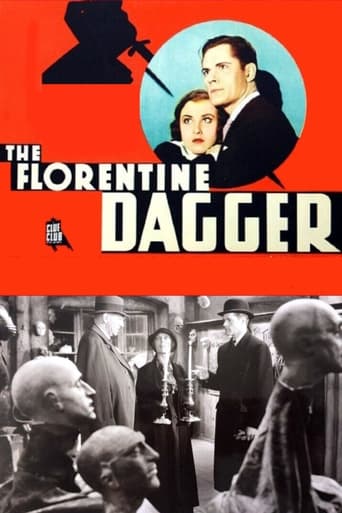blanche-2
"The Florentine Dagger" is a Warner Brothers film from 1935 starring Donald Woods, Margaret Lindsay, Henry O'Neill, and C. Aubrey Smith. Woods plays a descendant of the Borgias who comes to Italy to see the Borgia castle. Apparently afraid that he has inherited the Borgia madness, he tries to kill himself with a potion, but the psychiatrist (Smith) tells him it's fake. He suggests that Woods write a play about the family and achieve some closure that way. O'Neill plays a producer who does the play in Vienna, with his daughter (Lindsay) as the lead. The play is a huge hit, and Woods and Lindsay fall for one another. When O'Neill is stabbed with a Florentine dagger, Woods becomes the main suspect.Very atmospheric for such a small film with some good performances, particularly by Robert Barrat as a police inspector who's quite funny. Lindsay is miscast as this mysterious, goddess-like woman whose performance is the talk of Vienna. A Greta Garbo role in the hands of Margaret Lindsay, a completely different type.A short film, fairly well done given the budget.
Neil Doyle
This little programmer from Warner Bros. features a bunch of studio contract players, all trying to do their best to bring some life into an unlikely story about a man (DONALD WOODS) who thinks he's inherited a tendency to kill because he's from a long line of Borgias. Nevertheless, he's encouraged to write a play about Lucretia Borgia for the daughter of HENRY O'NEILL, played by MARGARET LINDSAY.When O'Neill becomes the victim of a stabbing, the plot thickens as Detective Von Brinkner (ROBERT BARRAT) goes about trying to solve the crime. But it's really C. AUBREY SMITH who does most of the snooping to uncover the reason behind O'Neill's vicious death.However, it's Barrat's lively performance as the playboy detective that gives a lift to the story and a bit of humor that's badly needed.It's really a B-film struggling to look like an A-film with some proper atmosphere and period settings, but the story is told in dull fashion and never quite becomes as fascinating as the film's imaginative title.
drednm
The Florentine Dagger is a strange little film full of atmosphere, but lacking the acting punch that might have put it over. A story of the curse of the Borgias in modern-day Vienna opens with three travelers (Donald Woods, C. Aubrey Smith, and Henry O'Neill) making a trip to a remote village in Italy where the Borgia castle still stands. The old inn is full of atmosphere and run my strange people (Charles Judels, Rafaella Ottiano). They take a tour which allows the viewer to be given the story of the Borgias' madness and its generational effects. Woods is Casare Borgia, the spitting image of an ancient ancestor (although the name is pronounced Cesar throughout the film). Woods decides to end the madness and orders a drug from the local apothecary. However, Smith (a psychiatrist) intervenes and tells Woods that the potion is fake. O'Neill is a famous theatrical producer. So Smith advises that Woods write a play and purge his Borgia madness. Of course Woods writes a play about Lucretia Borgia, which O'Neill produces. He also casts his "daughter" in the lead (Margaret Lindsay). The play is the talk of Vienna.Woods and Lindsay fall in love, but O'Neill is stabbed to death with one of the three Florentine daggers we had seen displayed earlier. Woods becomes the main suspect because of his erratic behavior and he is, after all, a Borgia. But Lindsay seems a tad off also. And Smith is always lurking. Enter the local inspector (Robert Barrat), a happy fellow who seems totally uninvolved with the murder case and is always receiving phone calls from Julia. Lindsay had left the play in a rush and is jailed on suspicion of murder. But then there is another dagger attack—this time on Smith. That clears Lindsay. Or does it? The police had let her go. Woods and Smith end up at an auction house, following a wigmaker (Eily Malyon) who buys the candle sticks that were found by O'Neill's body. Everyone converges at the wigmaker's shop and the crime is solved. All very tidy and clever. Barrat threatens to steal the film from the more stolid actors, but his character is too unbelievable, especially as he lets the murderer go free! Go figure.Paul Porcasi is a police man, Henry Kolker is the auctioneer, Florence Fair is the weird maid, Herman Bing (who has no part) is the baker, Louise Seidel is his assistant, and Frank Reicher is the stage manager. Woods is boring, Lindsay is miscast, and Smith is relatively subdued. Only Barrat and Malyon seem to have much life. Judels serves as the castle your host, but Ottiano seems irrelevant to the story. Makes one wonder about the editing here as Ottiano and Bing have no reasons to be in the story. And the play is a STINKER!
bmacv
This 65-minute mystery was part of the Warner Brothers' "Clue Club" series of programmers. Most of these short thrillers are truly unwatchable melanges of slapstick and skullduggery. The Florentine Dagger is a little better, and does keep one's interest with the foggy Viennese (as opposed to foggy London) locations, production values that aren't bottom-of-the-barrel, and a story that involves a descendant of the Borgias. C. Aubrey Smith lends a real whiff of greasepaint to the proceedings. Don't waste your life waiting for this one to roll around, but, if you catch it, you may find it a tolerable way to pass an hour.



